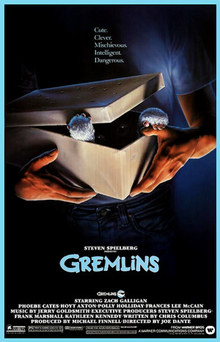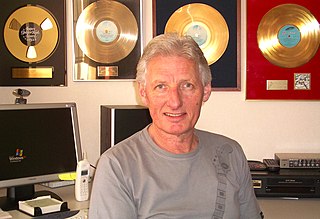Related Research Articles

Gremlins is a 1984 American black comedy horror film directed by Joe Dante, written by Chris Columbus, and starring Zach Galligan, Phoebe Cates, Hoyt Axton, Polly Holliday, and Frances Lee McCain, with Howie Mandel providing the voice of Gizmo, the main mogwai character. It draws on legends of folkloric mischievous creatures that cause malfunctions—"gremlins"—in the British Royal Air Force going back to World War II. The story follows a young man who receives a strange creature as a pet, which then spawns other creatures who transform into small, destructive, mischievous monsters that all wreak havoc on a whole town on Christmas Eve.

The Aotearoa Music Awards, conferred annually by Recorded Music NZ, honour outstanding artistic and technical achievements in the recording industry. The awards are among the most significant that a group or artist can receive in New Zealand music, and have been presented annually since 1965. The awards show is presented by Recorded Music NZ. A range of award sponsors and media partners support the event each year.
The following lists events that happened during 1970 in New Zealand.
The following lists events that happened during 1971 in New Zealand.
The following lists events that happened during 1972 in New Zealand.
The following lists events that happened during 1973 in New Zealand.
Golden Kiwis – The Hits Collection is a 3-disc New Zealand compilation album released in 2005 featuring hit songs from the 1960s to the 1980s.
Maria Dallas was discovered at a talent contest in small town of Morrinsville, New Zealand.
Suzanne Joy Lynch is a New Zealand singer who has worked professionally under the names Suzanne Donaldson, Suzanne Lynch and Suzanne.
Zodiac Records was a New Zealand based label founded in 1950. It was originally owned by Stebbing Recording and Sound, Ltd.(until 1965) then Zodiac Records Ltd., headquartered in Auckland; the company also released both 78s and 45s. Artists that released their records on that label included Howard Morrison, Herma Keil The Keil Isles, Ray Columbus and The Invaders, Allison Durbin, Sandy Edmonds, The Pleazers, The Gremlins. It also had a distributed label, Viscount Records, owned by Gary Daverne, Eldred's cousin.
The Recording Arts Talent Awards (RATA) were an annual award honouring excellence in recorded New Zealand music. The RATAs ran from 1973 to 1976, before being replaced by the RIANZ Awards.
The Yeomen were a New Zealand band of the 1960s. It included Brian Borland, Peter Carter and Gordon Hubbard.
The 2015 New Zealand Music Awards was the 50th holding of the annual ceremony featuring awards for musical recording artists based in or originating from New Zealand. It took place on 19 November 2015 at Vector Arena in Auckland and was hosted by Taika Waititi. The awards show was broadcast live on TV3, and hosted by Sharyn Casey and Dominic Bowden. 2015 marks the 50th anniversary of the awards from its origins in 1965 as the Loxene Golden Disc.

Glyn Tucker Jr. was a leading figure in the New Zealand music industry for more than twenty years. Following an early career as a singer/songwriter in The Gremlins (1965–1968) he founded Mandrill Recording Studios in Auckland in 1975, and produced and engineered hundreds of New Zealand songs in the late seventies, eighties and early nineties.

20 Studio One Hits was a compilation album of New Zealand and New Zealand based artists culled from the Studio One television series on the N.Z.B.C. It was released in 1972. It was followed up by 20 Studio One Hits Volume 2 the following year. The albums are representative of the televised Studio One talent quests. Some of the songs that appeared on the album went on to become hits in Australasia. The records which were released on the Music for Leisure label are a historical account of the Studio One talent quests.
The Hamilton County Bluegrass Band is a long-running New Zealand bluegrass band. They have been performing since the 1960s.

Shane Paul Arthur Hales, known by the stage name Shane and for some of the early part of his career as Trevor Hales, is a New Zealand singer who had several top-10 hits in that country's singles chart in the 1960s and 1970s.
The Hi-Revving Tongues were a New Zealand rock band from Auckland, led by vocalist/songwriter Chris Parfitt.

The Redwood 70 National Music Convention, commonly referred to as Redwood 70, was a music festival held on Auckland Anniversary Weekend in Swanson, West Auckland, New Zealand in 1970. Held six months after the Woodstock festival in the United States, Redwood 70 was the first modern multi-day pop music festival held in New Zealand. Headlined by Robin Gibb of the BeeGees with a line-up of predominantly New Zealand musicians, Gibb and his backing orchestra were pelted by objects from the crowd. While the concert did not turn a profit, it popularised the modern multi-day music festival in New Zealand.
Kenneth Arthur Lemon is a New Zealand country musician who was active from the 1960s to the 1980s. His single "Living in a House Full of Love" was a finalist for the 1966 Loxene Golden Disc. He toured and released an album with Maria Dallas in 1967. In the early 1970s, Lemon was a regular performer on the television country music variety show The Country Touch, hosted by Tex Morton.
References
- ↑ "Loxene Golden Disc Awards". NZ History online . Retrieved 6 November 2012.
- 1 2 3 4 "Loxene Golden Disc Awards". AudioCulture . Retrieved 11 November 2015.
- ↑ "1973 Winners". Kiwi TV. Retrieved 6 November 2012.
- 1 2 3 4 5 Grigg, Simon. "Loxene Golden Disc". Audio Culture. Audio Culture. Retrieved 12 November 2015.